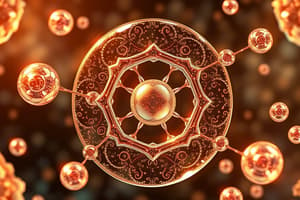Podcast
Questions and Answers
What type of compounds can either have dipole-dipole interactions or hydrogen bonding?
What type of compounds can either have dipole-dipole interactions or hydrogen bonding?
- Nonpolar covalent compounds
- Metallic compounds
- Polar covalent compounds (correct)
- Ionic compounds
Why do H2O, HF, and NH3 have higher boiling points than others in their groups?
Why do H2O, HF, and NH3 have higher boiling points than others in their groups?
- Due to London dispersion forces
- They can form hydrogen bonding (correct)
- Due to the presence of ionic bonds
- Because they are metallic compounds
What causes some molecules with polar bonds to be nonpolar as a whole?
What causes some molecules with polar bonds to be nonpolar as a whole?
- Lack of any intermolecular forces
- Cancelling of dipole moment due to molecular geometry (correct)
- Presence of metallic bonds
- Having strong London dispersion forces
Which type of intermolecular force is present in nonpolar covalent compounds?
Which type of intermolecular force is present in nonpolar covalent compounds?
What is polarizability a measure of?
What is polarizability a measure of?
Under what conditions can polar covalent compounds exhibit hydrogen bonding?
Under what conditions can polar covalent compounds exhibit hydrogen bonding?
What type of forces govern the interaction between ionic compounds?
What type of forces govern the interaction between ionic compounds?
Which compound listed has the highest melting point?
Which compound listed has the highest melting point?
What type of bonds involve the sharing of electrons between two nonmetal atoms?
What type of bonds involve the sharing of electrons between two nonmetal atoms?
How can the polarity of a molecule be determined?
How can the polarity of a molecule be determined?
What are polar covalent compounds characterized by?
What are polar covalent compounds characterized by?
What type of intermolecular force is present in between all electrically neutral molecules?
What type of intermolecular force is present in between all electrically neutral molecules?
Which type of intermolecular force results from the electrostatic attraction of a molecule containing a dipole and an ion?
Which type of intermolecular force results from the electrostatic attraction of a molecule containing a dipole and an ion?
What is a special kind of dipole-dipole force that exists when hydrogen is bonded to the most electronegative atoms?
What is a special kind of dipole-dipole force that exists when hydrogen is bonded to the most electronegative atoms?
How can one determine the intermolecular force present for a molecule?
How can one determine the intermolecular force present for a molecule?
Which type of intermolecular force is a moderately strong type and is present in polar molecules?
Which type of intermolecular force is a moderately strong type and is present in polar molecules?
In ion-ion interaction, what is being attracted to each other?
In ion-ion interaction, what is being attracted to each other?
Flashcards are hidden until you start studying
Study Notes
- Molecules can have partial positive and negative charges known as a dipole due to the distribution of charges within the molecule.
- Polar covalent compounds can exhibit dipole-dipole interactions or hydrogen bonding, while nonpolar covalent compounds have only London dispersion forces.
- Hydrogen bonding in molecules like H2O, HF, and NH3 leads to higher boiling points compared to other compounds in their groups.
- Polarizability measures how easily the electron distribution of a molecule can be distorted.
- Interactions between molecules can be ion-ion, ion-dipole, dipole-dipole, or London dispersion forces, depending on the types of compounds present.
Studying That Suits You
Use AI to generate personalized quizzes and flashcards to suit your learning preferences.




